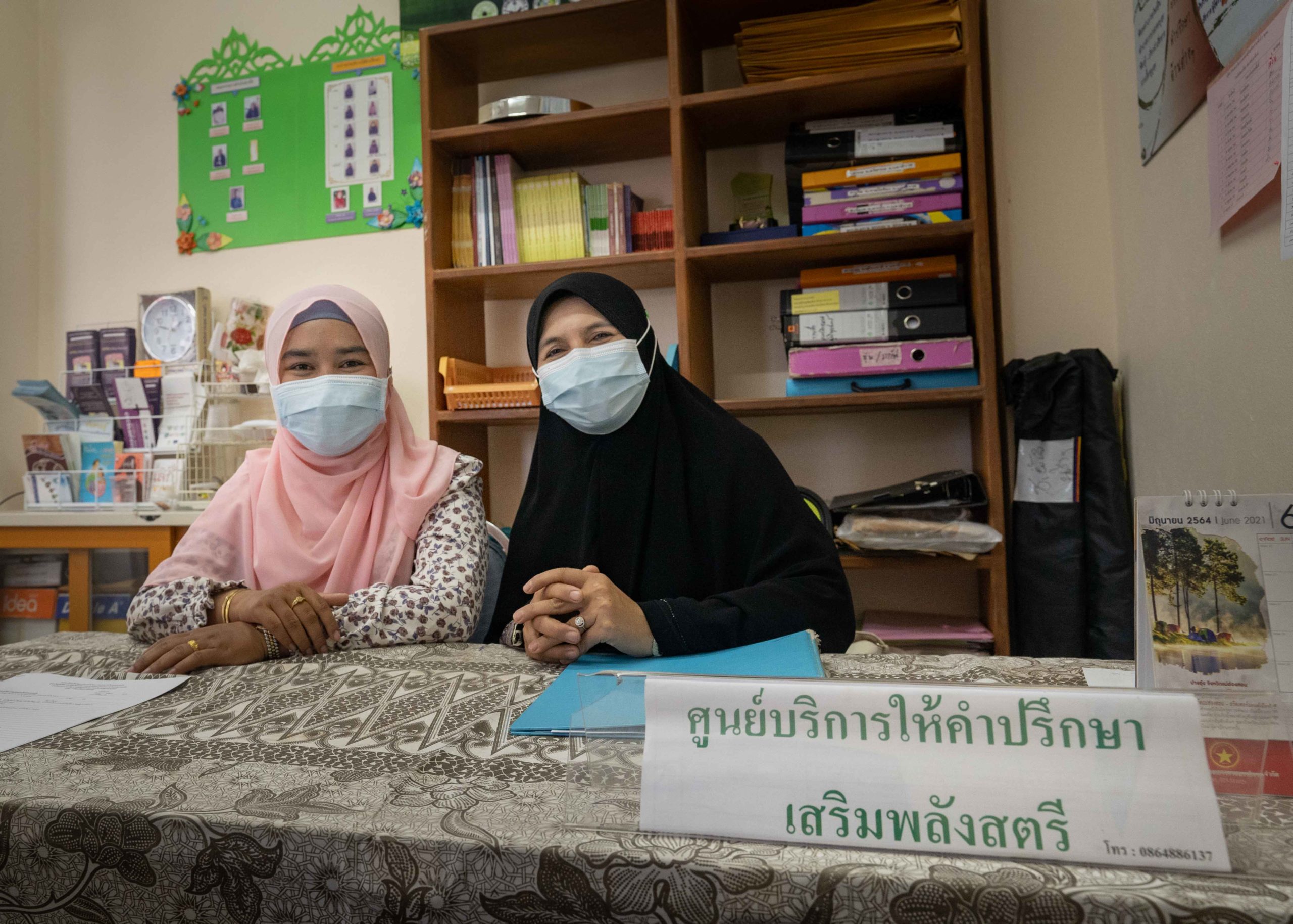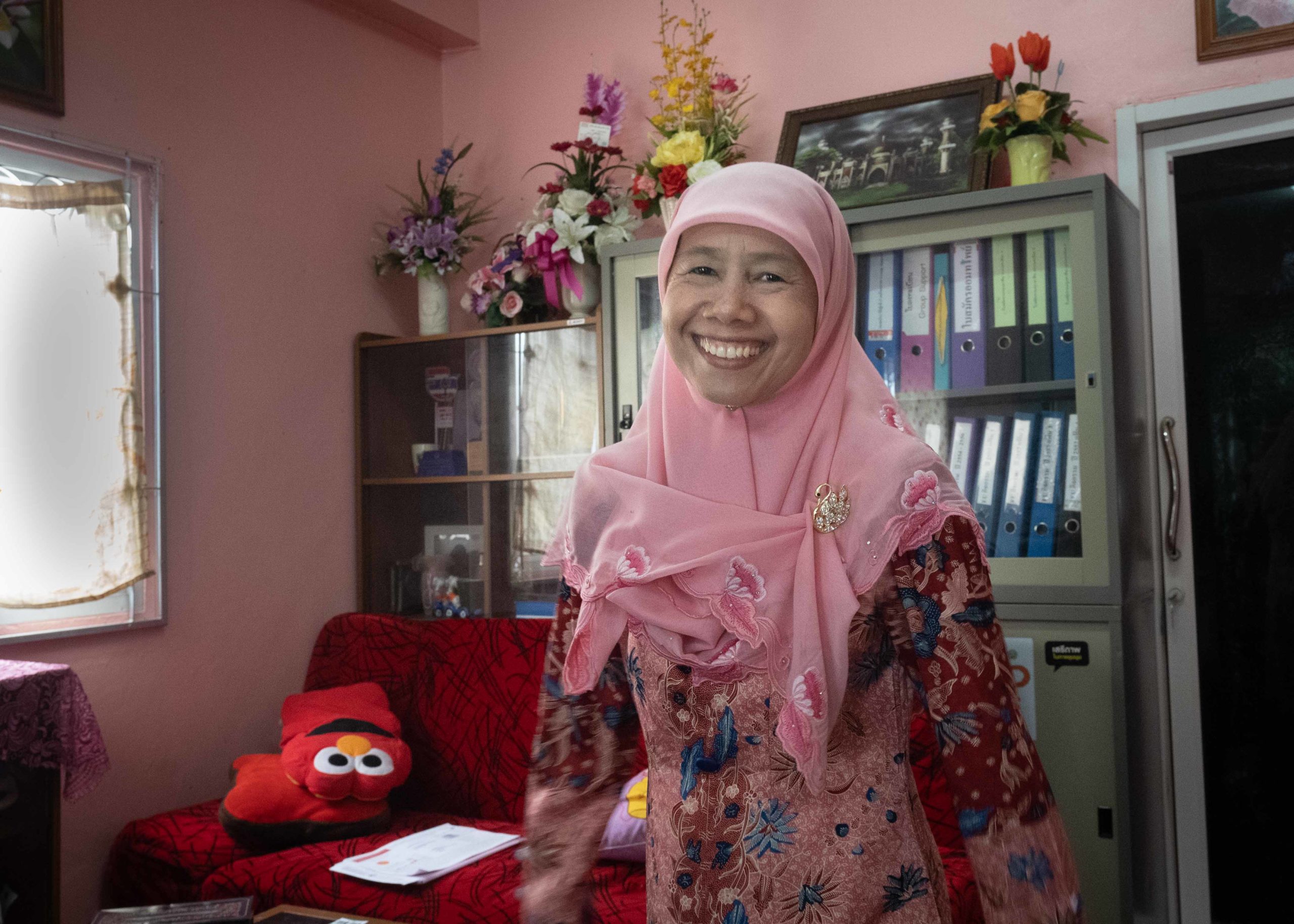Just over two years ago, Fatima, whose name has been changed here, ran across the grass at her parents’ home in southern Thailand to try and stop her husband from driving away with their four-month old baby.
Fatima and her mother struggled to hold him back, but after he put the baby inside the car, he grabbed Fatima’s mother around the neck, choking her, in order to free himself from the two women.
“Fatima fainted in front of the car, but he drove off with the child inside, running over her legs,” Fatima’s sister said, speaking to the Globe. “She was lucky nothing was broken but she went into shock, being hit by the car and watching her child being stolen.”
Isolated geographically and culturally from central government in Thailand, Thai-Muslim women in the country’s southernmost provinces are working together to combat domestic abuse against women like Fatima, who are often unaware or unable to access government support. Together, a coalition of women’s groups and NGOs have organised their own counseling networks, including two offices at the Islamic Council’s provincial headquarters in Yala and Narathiwat.
Opening offices on these premises, where the main Islamic centres for the two provinces are also headquartered, required prior approval of local, all-male religious leaders, who in the past have resisted female participation in addressing issues of marital conflict.
“We write and record everything in a document. We start by asking them some specifics, and then we listen,” said Rusleena Saleng, the counselor at the office in Narathiwat, the Women’s Empowerment and Counseling Center, which opened in 2018.
“We had a total of 300 cases in 2018 and resolved 100 of them which was a good result,” commented Saleng from their one room with large windows opening to a view of the comings and goings at the Islamic Council’s provincial headquarters in Narathiwat.

The two offices are staffed with one paid, full-time counselor and a handful of part-time volunteers. The all-female, all-Muslim staff speak Thai in addition to Jawi, the Malay-family language commonly used in Thailand’s Deep South – the three southernmost provinces of Narathiwat, Yala and Pattani.
Before most women come to the office they have typically gone through a long period of abuse, according to Thai researchers from Walaliak University, who surveyed Deep South women in 2019, publishing their findings in an OXFAM International-commissioned report called Break the Silence. Their findings showed victims there hold the belief that a pious Muslim woman doesn’t speak about marital problems with others – not with police, medical providers, male religious leaders or even female relatives.
The research team from Walaliak University revealed cases of women who had been “held at gunpoint, hit by gun handles, strangled and kicked in the face, as well as kept under house arrest.” One of the survey’s co-authors, Amporn Marddent, told the Globe that keeping issues of violence within the family is expected in Thailand’s Deep South.
“To bring shame by talking about issues of domestic violence with people outside of the home, this is not the culture in this area,” Marddent said. “They go to the Imam first, but the Imam basically does not have the skills, or he doesn’t understand and tries to keep the problems minimised.”
Fatima initially went to her Imam for help as well, but as her sister described: “[Our local imam] didn’t pay her much attention. He didn’t know how much my sister had gone through and was suffering deep down inside.”
It’s prohibited in Islam to promote divorce, so the only thing we can do is to ask how they are doing and give them some procedural guidance
When a woman finally does come for help, councilors at the offices are careful to record the details of their case, even notating evidence of physical violence which religious scholars can then use to issue a divorce if necessary. Gathering such evidence is a particularly helpful aspect of the office’s work, because religious scholars are not permitted to view intimate parts of womens’ bodies and previously had no way of verifying that physical violence had taken place.
In 2020, there were a total of 3,030 cases at the Narathiwat and Yala counseling offices combined, according to documents shared with the Globe. Physical violence was a component in 23% of these cases – 201 cases in Narathiwat and 486 in Yala.
Women can talk in confidence about anything, but most come to discuss issues related to their marriages, whether that may be emotional or physical abuse, spousal drug or alcohol abuse or inadequate financial support. In a large number of the cases, women sought information on divorce, forcing Saleng to choose her words carefully.
“Helping women to get a divorce is similar to wanting them to get a divorce,” said Saleng. “It’s prohibited in Islam to promote divorce, so the only thing we can do is to ask how they are doing and give them some procedural guidance.”
Giving advice regarding marital conflict is a domain male religious leaders still reserve exclusively for themselves, so female counselors instead liaison with Islamic scholars on women’s behalf when needed. The offices also contact Thai government officials when needed. In Fatima’s case, the office guided her and her mother through the legal process at a local government department, aiding them to secure a few thousand Baht (around $100) as compensation for the physical abuse they endured.
These offices, and the women’s networks powering them, are targeting a group which Thai government programmes fail to reach: poorly-educated Muslim women in the Deep South.
”The government can help and there are Muslim officials who work in those agencies too, but if no one sends them a request for aid, they’re not aware of the problem,” said Saleng.
“Now that they have data from us, they know that there are women here who have been abused but that they couldn’t reach.”

But violence against women is a significant public health issue across Thailand, not just the Deep South. A 2018 survey published in the Journal of Family Violence, estimated that 15% of partnered Thai women, roughly 5 million, have experienced psychological, physical, and/or sexual violence at some point in their lives.
Despite the magnitude of the problem, Thailand’s various government schemes are unable to target all the women who need aid. In 2020, there were only 1,841 total calls made to the government’s 1300 Hotline number reporting domestic violence, according to data from the Ministry of Social Development and Human Security. This compares to a combined 687 cases recorded in Narathiwat and Yala involving violence for the same year.
“The problem is that women don’t go to government agencies for assistance,” said Roseedah Pusu, a journalist in Pattani who started the Women Network Overcoming Violence in 2007.
From a red couch in her office on the noisy highway between Pattani and Narathiwat, Pusu detailed the barriers to Deep South women receiving government aid.
“They use a different language [Jawi] and because of their ignorance of the law, government programmes are inaccessible to them,” she said.
In 2017, in addition to her own women’s network, Pusu brought together the Muslimah Women’s Club in Narathiwat, Muslim Women Welfare Association in Yala and the Thailand Association of Social Workers. With support from OXFAM Thailand, they set up the offices in Narathiwat and Yala, recruited counselors and volunteers and even brought in a team of trainers from Thailand, Malaysia and Indonesia. Despite limitations due to Covid-19, this coalition has been able to further expand their counseling network in recent months.
“This year we started the first of our 18 district-level offices, so people can go there instead of the main ones [in Narathiwat and Yala]. They can address their problems within their own community,” said Pusu.
I talked to the president [of the Pattani Islamic Council] and he agreed, but when he proposed my project in a meeting and said the project would be led by women, the others immediately said no
But although thousands of women have come in seeking help, it’s unsure how long the two offices can keep going.
Threatening their work is a lack of funding. OXFAM’s financial support expired in 2020 which covered launching the two offices, staff and volunteer training as well as salaries for the two full-time counselors. Thailand’s Ministry of Social Development and Human Security (MSDHS) has stepped in this year to fund the full-time counselor positions but hasn’t yet committed to 2022, despite evidence from around the world that the preventive work these offices perform end up saving government money.
An additional challenge lies within Thailand’s religious community. Many Islamic leaders, all men, are still against women having such an active, visible role in matters of marital conflict. Before the offices opened in Narathiwat and Yala, Pusu tried unsuccessfully to win approval from religious leaders to open an office at the Islamic Council’s provincial headquarters in Pattani.
“I talked to the president [of the Pattani Islamic Council] and he agreed, but when he proposed my project in a meeting and said the project would be led by women, the others immediately said no,” said Pusu.
Even if sustainable funding can be found and a new office established in Pattani, these counseling offices are inherently limited in what they can accomplish by the religious communities they operate within and provisions in Thai law.
In Fatima’s case, while she was able to get a divorce, she hasn’t been able to get her child back. With no additional procedures to aid her situation, her case at the office in Narathiwat has since been closed. She’s been on medication since the day she was run over in April 2019.
“Her mental state is unpredictable,” said her sister.


